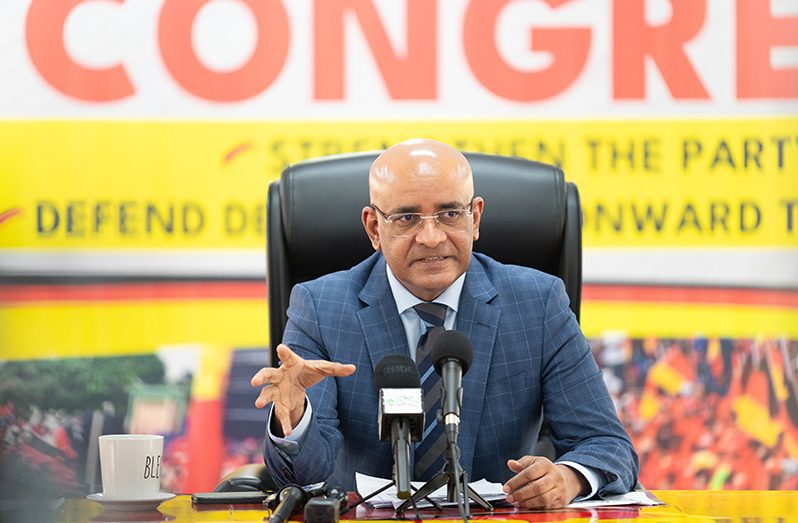-Jagdeo assures; reminds of country’s massive forestry coverage, ability to trap emissions
AT maximum production of its oil and gas resources, Guyana will remain a carbon sink nation, Guyana’s Vice President, Dr. Bharrat Jagdeo has said.
Dr. Jagdeo’s comments came after the country’s focus on fossil-fuel extraction was questioned regarding whether it would contradict global efforts to combat climate change during a recent publication of BBC’s HARDtalk.
Defending the government’s strategic decision to utilise its oil resources while simultaneously maintaining its forest, Dr. Jagdeo reminded that the country boasts over 87 per cent of standing forest.
“Every year, our forest sequester over 150 million tonnes of carbon from the atmosphere. If we are emitting 12 million tonnes per annum from six FPSO [Floating Production Storage and Offloading], we don’t have six operating as yet but I am talking about peak that [sic] is only seven per cent of the carbon that our forest sequesters from the atmosphere.”
‘So we cannot become a carbon bomb. We will remain a carbon sink even at maximum production at 1.5 million barrels per year,” he added.
Guyana’s forest stores approximately 19.5 gigatonnes of carbon with the country maintaining a low deforestation rate, Dr. Jagdeo explained.
“We have the lowest deforestation rate in the world and after 100 years of producing gold, we still have 85 per cent of our country covered with forest.

CLIMATE PROOF
Recognising the threat and vulnerability brought on by climate change, Guyana is spending millions to ensure climate security.
“We will be spending 122 million [dollars] of the 150 million [dollars] we earned from the sale of forest carbon and over time maybe over, two` billion from the sale of forest carbon to climate proof ourselves,” Dr. Jagdeo explained.
Back in January 2023 Guyana received its first payment of US$37.5 for carbon credits under an agreement with the Hess Corporation. Then in July, a similar sum was handed over to Guyana, bringing the total received this far to US$75 million. Guyana is expected to collect a minimum of US$750 million by 2030.
The payments are a result of the Government of Guyana’s continued recognition of the important role that the country’s forests play in not only the development of the country, but in combatting climate change globally.
Guided by the ground-breaking Low Carbon Development Strategy (LCDS) 2030, Guyana has set out a vision for monetising the climate and ecosystem services provided by our standing forest, while accelerating the country’s economic development along a low carbon trajectory.
Even as Guyana seeks to implement initiatives to combat the effects of climate change, Dr. Jagdeo reminded the nation that the vulnerability of climate change exist whether the country produces oil or not.
“This vulnerability is not driven because of our own action but because of what is [happening] globally…to which we are a minuscule contributor,” he said.
What about the amoral obligation of the develop world? Jagdeo questioned before adding: “The current concentration of greenhouse gases that is already driving climate change was almost out there entirely by the developed world, but they want us to be more responsible.”
GOOD MANAGEMENT OF RESOURCES
Guyana, Dr. Jagdeo said has been managing its resources in a sustainable and accountable manner.
“We are managing even better than most of the developed world. We have total transparency in [our] resources. Every cent has to be appropriated by the Parliament before it is spent,” he explained.
In 2021, the government amended the Natural Resource Fund Act to bring greater transparency and accountability in the management of Guyana’s oil resources, including the requirement of the government to seek annual Parliamentary approval for withdrawals from the NRF as stated in Section 19 of the NRF Act 2021.
“We are very pleased with our stewardship and strong measures that we have put in place to manage the sector,” Dr. Jagdeo added.



.jpg)









